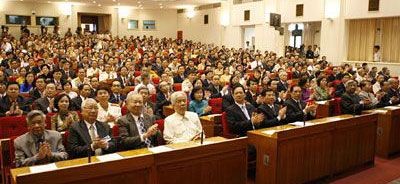January 6th 1946 is an important day for the Vietnamese nation as it marks the people’s first general election, giving birth to the National Assembly of the Democratic Republic of Vietnam. On the occasion of the 66th anniversary of the general election, Thu Hang considers its implication.
Historian Duong Trung Quoc underlines the role of President Ho Chi Minh, who pioneered the building of a law-governed state, a modern political entity, after the August 1945 revolution announced the overthrow of both European colonial occupation and a thousand year old feudal regime. 20 years of traveling and studying revolutionary movements around the world persuaded Ho Chi Minh that a state governed by law was superior to one governed by forces: “It was a most progressive political entity because we built a state on the basis of democracy. In 1945, when the war ended, not every country in the world had a universal suffrage system and even some advanced nations in Europe did not accept gender, ethnic and religious equality as Vietnam did”.
On January 6th 1946, despite enemy attempts to sabotage the young administration, 89% of eligible voters nationwide, cast ballots to elect 333 representatives. The general election’s success opened a new period for the Vietnamese people, who were at last fully represented by a legitimate National Assembly, a unified government and a popular administrative system. Lieutenant-General Dong Sy Nguyen said the formation of the first National Assembly marked Vietnam’s shift from slavery to mastery: “The first National Assembly rallied the entire nation’s strength to fight for independence and freedom without reliance on foreigners. Since then the Vietnamese people have had the right of freedom of assembly. It also opened a new chapter of national unity from grassroots to central levels, from rural areas to cities, between social classes and religions; everybody joined the war of resistance. Under the Party’s leadership, the National Assembly undertook its mission of uniting people to win the war against the French invaders”.
 |
| The 12th National Assembly |
Former 2-term deputy Mua Thi My in the northern province of Son La talked to VOV about her predecessors: “I greatly admire the generations of deputies, especially those of the first term. When the country was at war, they overcame numerous difficulties to build socialism and fight for national unification. As successors, who inherited independence, we will continue to work for national poverty reduction and children’s education”.
The National Assembly is now in its 13th tenure. The legislative process has been reformed to meet the current needs of national development. Supervision activities have become more substantial with Q&A sessions broadcast live, showing open, frank and constructive dialogue. The National Assembly decides major issues of the nation, including state and government structure and personnel. The Assembly’s democratic practices have played a major role in building a law-governed socialist state of Vietnam of the people, by the people and for the people.
Thu Hang